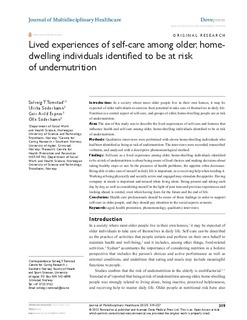| dc.description.abstract | Introduction: In a society where most older people live in their own homes, it may be expected of older individuals to exercise their potential to take care of themselves in daily life. Nutrition is a central aspect of self-care, and groups of older home-dwelling people are at risk of undernutrition.
Aim: The aim of this study was to describe the lived experiences of self-care and features that influence health and self-care among older home-dwelling individuals identified to be at risk of undernutrition.
Methods: Qualitative interviews were performed in eleven home-dwelling individuals who had been identified as being at risk of undernutrition. The interviews were recorded, transcribed verbatim and analyzed with a descriptive phenomenological method.
Findings: Self-care as lived experience among older home-dwelling individuals at risk of undernutrition is to be aware of food choices, and make decisions about making healthy steps or not. When having health problems, the appetite often decreases. Being able to take care of oneself in daily life is important as well as receiving help when needing it. To work at being physically and socially active and engaged may stimulate the appetite. Having company at meals is important and missed when living alone. To be present and taking each day by day, as well as considering oneself in the light of past time and previous experiences and looking ahead, is central, even though having fears for the future and the end of life.
Conclusion: Healthcare professionals should be aware of these findings in order to support self-care in older people, and they should pay attention to the social aspects at meals.
Keywords: aged, health promotion, phenomenology, qualitative interviews | nb_NO |
